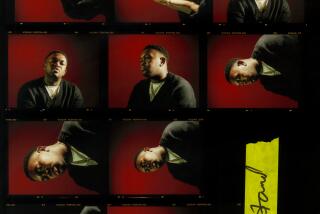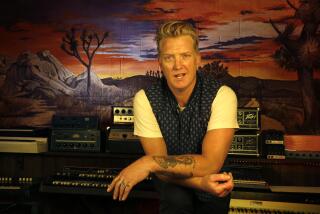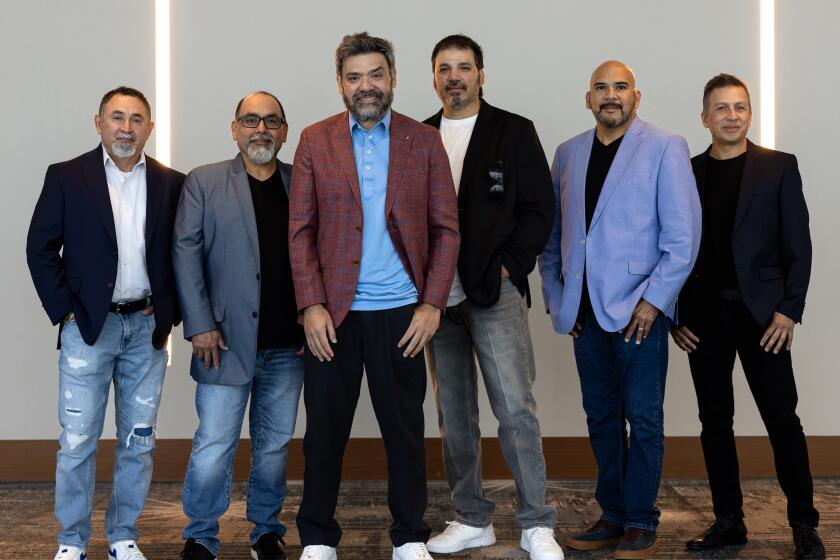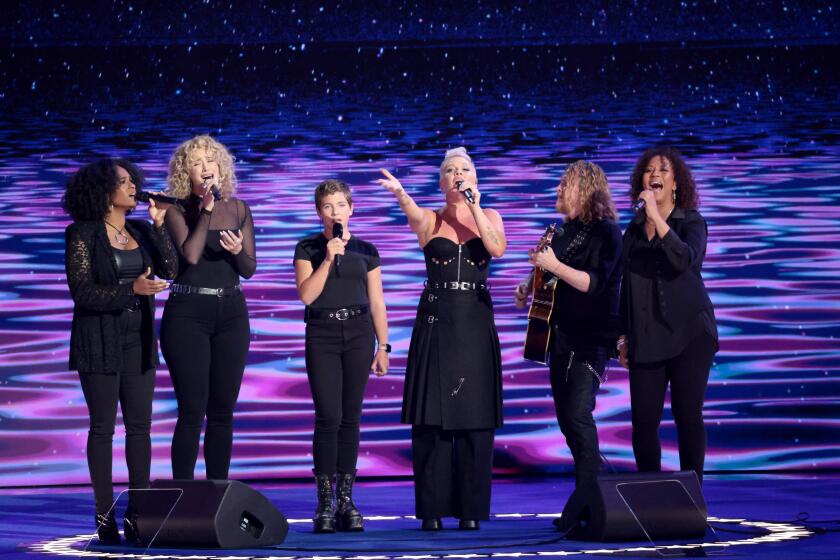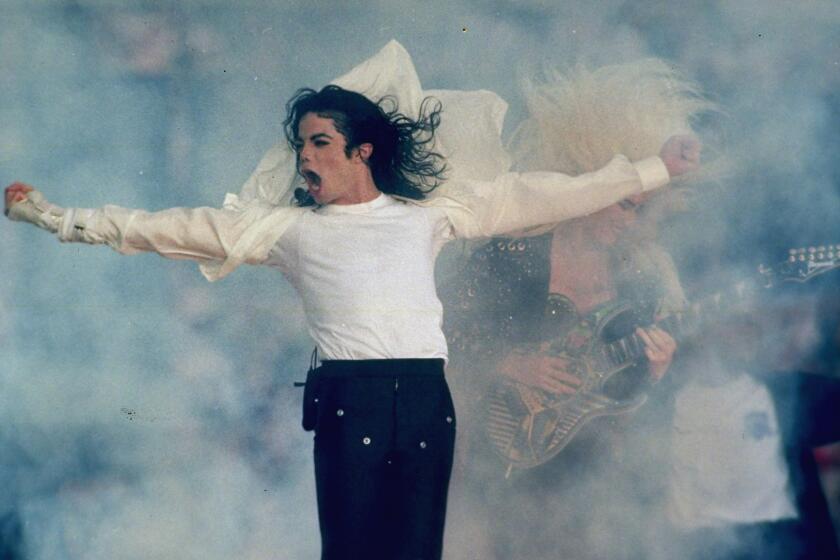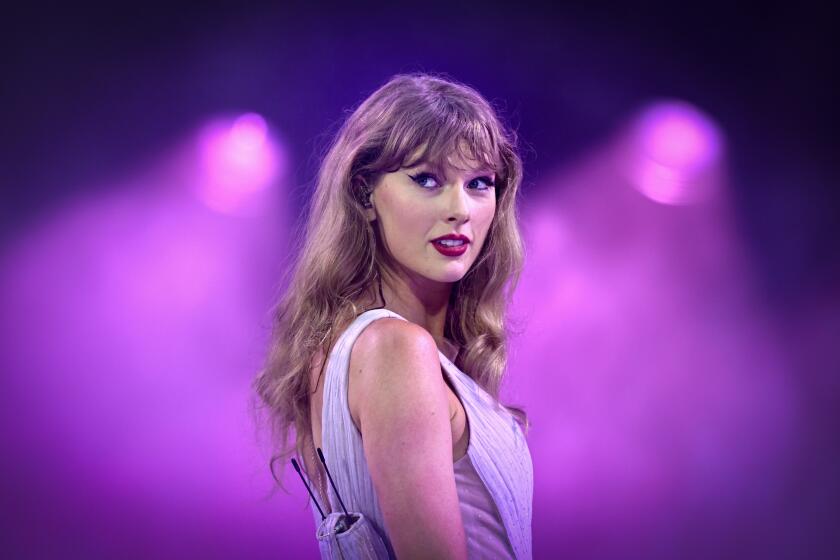Cassandra Wilson, the Jazz Vocalist, Laughs at Limits : Singer: She’s comfortable with hip-hop, rock, blues or bop and refuses to accept conventional wisdom on marketing her career.
Cassandra Wilson, the alleged jazz vocalist, was driving through her home state of Mississippi recently. She pulled into a Stuckey’s and heard, over the tinny speakers that seem always to fill a place with the dopiest of tunes, a musical inspiration--a compelling sound that locked her happily in place.
It wasn’t Charlie Parker, whose blazing bop vocabulary in the mid-1980s “possessed” Wilson. Neither was it the bold and inventive Betty Carter, of whom Wilson might be considered a free-form legatee.
It was Hank Williams Sr., the daddy of country crooners, balladeer of the broken, fixer of Southern hearts, dimestore poet of longing and hope.
Twang.
Wilson delights in such a seemingly dissonant event. It is the kind of thing that girds her argument that American music--whether jazz, country, blues, hip-hop or rock ‘n’ roll--has no boundaries, suffers no Balkanized turf, goes unyoked by even the savviest marketer’s idea of the segmented audience.
Indeed, Wilson is the first to admit, “I just don’t see the differences anymore.” As a result, little in American music seems safe anymore from the roving Cassandra Wilson.
That is good news, as jazz fans and, increasingly, mainstream audiences have come to learn.
Wilson went from being a Brooklyn jazz rebel in the mid-1980s to one of the finest interpreters of traditional jazz ballads in the late 1980s to the release of a hip-hoppish CD in 1989 to her current hit, a year-old Blue Note recording that dispenses with the jazz trio format altogether.
That CD, titled “Blue Light ‘Til Dawn,” sets Wilson’s mahogany alto, fat and slow as molasses, against an anorexic backdrop of pedal steel guitar, accordion, bass--and in one over-dubbed a cappella instance, nothing at all. Her voice fills all the spaces between the instruments, like a thick fog in the forest. The songs are Robert Johnson blues; Van Morrison, Joni Mitchell and Stylistics pop; and jazz-tinged Wilson originals.
Like the person herself, the session is a highly original stew that reaches well beyond jazz’s walls and whose naked debt is to all the influences an unbound American youth could gather growing up in Jackson, Miss., in the 1960s and 1970s.
This, and whatever else the peripatetic Wilson is up to, will be amply displayed in performances Thursday night at the Strand in Redondo Beach. This will follow by one day her appearance at the Belly Up in Solano Beach.
These shows will be anything but the anomalous appearances of a budding and musically correct jazz vocalist. They precede a monthlong European tour that includes headlining at London’s Royal Albert Hall; the release of two tribute CDs, one to the music of the former Prince and another to Van Morrison, featuring her renditions of “When Doves Cry” and “Crazy Love,” respectively; and the Thanksgiving release of the Arnold Schwarzenegger-Emma Thompson movie, “Junior,” in which Wilson is filmed singing “I’ve Got You Under My Skin.”
In recent months she has done the vocals for Wynton Marsalis’ big-band composition “Blood on the Fields.”
If anyone is humbled by her success, it is Wilson. In a conversation that hip-hops from the lean, heartfelt artwork of Romare Bearden (a Wilson favorite) to the movie “To Kill a Mockingbird” (it “still haunts,” she says) to the problems of living a sane life in New York (“I go home to Jackson, Mississippi, a lot, to stay grounded”), Wilson ponders the terrible question of what, precisely, she does in her music.
“I think it’s too soon for me to say what I’m doing,” she says. “That is, I’m not sure. It’s evolving.”
Her voice trails off for a moment, then takes things to their most basic level. She cites the importance of her home in Jackson, where she grew up listening to her jazz guitarist father, Herman Bradley Fowlkes, and his epic record collection. Where the very air of Jackson and the South was filled with the blues. Where her time in college was defined by musical appetites that embraced not only jazz and blues but Motown and rock and folkies such as Bob Dylan. Where to this day she feels “much freer than anywhere else.”
She would move to New Jersey and then New York and fall in with a Brooklyn collective known as M-BASE, a loose-knit cabal fluent in Manhattan’s bop and mainstream vocabularies but which chose to challenge convention by experimenting with time, key and alternative urban voicings. Among these pilgrims were the now front-line saxophonist Steve Coleman and pianist Geri Allen. They sought a music that would forever get them off a stuck-in-time “Green Dolphin Street.”
Wilson’s passage was peculiarly personal. “Blue Light,” her ninth album, is clearly her first in what could be called a truly original voice: a soulful, slippery form of singing that cuts close to the bone and employs whatever musical genre or structure it takes to support it. Some of it is jazz, some of it blues, some of it a seemingly ancient cadenced verse--with all of it forming its own distinct language of tone, spaciousness, understated spirituality. In jazz’s greatest tradition, it is bold and free of constraint and yet sprouted from so many roots.
The intimacy of the music owes, Wilson says, to the fact that she makes no effort to divide music from her life.
“I’m just getting to the point where I’m in touch with my emotions,” she says. “What’s important is singularizing an emotion and building upon it musically.
“I’m moving beyond technique. This helps me to open up and pull from my experience and be vulnerable in my music. It’s important to get closer to that kind of expression so that, as an artist, (you) can give a particular take on reality.”
She pauses a moment.
“I am happiest when people are moved, when a spiritual presence is felt, when they sense God.”
Wilson considers the weight of her words. A gap in the conversation fills with the echo of those who took like inner journeys to find original expression using the musical forms around them, if not always with the spiritual bent: Charlie Parker, Miles Davis, John Coltrane, Betty Carter.
“That’s why my music has thrown some people for a loop,” she says. “I just don’t see differences in forms of music. There really isn’t all that much difference in all the music created in America. “What am I doing? There’s nothing to base it on or compare it to. All I can say is that it’s do-able and possible and real--because I’m doing it.”
That’s certainly an air-tight deduction. But where others had slower routes to recognition--and, save Davis, hardly any notice outside jazz--Wilson has far surpassed home-run sales on “Blue Light” with more than 100,000 copies sold. To make matters more un-jazz, mainstream Capitol Records, which owns Blue Note, promotes Wilson with a real budget.
Even Capitol, however, can’t be sure what to expect from the protean Cassandra Wilson.
Wilson just doesn’t know how else to proceed.
“Capitol certainly has come to the party,” she says. “I am happy about that. But I keep threatening to show up one day in jeans and with a guitar--and they’d drop dead at that.
“The truth is, all I can do is let the record company know what’s coming. That’s what happened on ‘Blue Light.’ And right now, I don’t know.
“Things are in change. Life and music are in change. I’m just expanding on the sounds in my (“Blue Light”) band and my life at this very moment.”
More to Read
The biggest entertainment stories
Get our big stories about Hollywood, film, television, music, arts, culture and more right in your inbox as soon as they publish.
You may occasionally receive promotional content from the Los Angeles Times.
